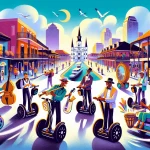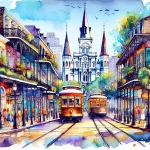Tucked within New Orleans’s diverse cultural landscape lies Zion City, a neighborhood that has interwoven its distinct cultural threads into the city’s vibrant heritage. This small enclave, often overshadowed by its more renowned counterparts, has a storied past worthy of celebration and exploration.
In This Article
TL;DR
- Zion City’s historical significance stems from its role as a cultural hub for the African American community, shaping the city’s musical landscape and civil rights movement.
- The neighborhood’s distinct cultural contributions, notably in music and community events, have enriched New Orleans’s diverse tapestry.
- Initiatives and establishments like the Zion City Revitalization Movement and local churches continue to keep the spirit of Zion City alive and vibrant.
Zion City’s origins can be traced back to the mid-19th century when it was part of the larger Gert Town neighborhood. Initially known as a “Negro section” of Broadmoor and Mid-City, the area’s residents sought to establish their own identity in the 1930s, naming it after a burgeoning musical group. This act of self-determination laid the foundation for Zion City’s distinct cultural identity.
Cultural Significance
The influence of African American culture is deeply rooted in Zion City’s identity. From the soulful melodies of gospel music echoing through church halls to the vibrant traditions and annual events that bring the community together, the neighborhood’s cultural tapestry is a testament to the resilience and creativity of its residents.
Annual events like the Zion City Tribute, covered by the Louisiana Weekly in 1940, celebrated the neighborhood’s achievements and highlighted its influential figures, including business leaders, musicians, and community organizers. These events fostered a sense of pride and served as a platform for showcasing Zion City’s rich cultural heritage.
Music and Jazz Scene
Zion City’s musical legacy is intertwined with the birth and evolution of jazz in New Orleans. The neighborhood has produced pioneering musicians who have left an indelible mark on the city’s musical landscape.
One such pioneer was Gertrude “Gert” Rainey, better known as Gert Town’s own “Trumpet Records Mama,” who played a pivotal role in shaping the city’s blues and jazz scene. Other notable musicians from Zion City, like Tony “Tiger” Owens, have earned recognition as “underground heroes” and “Lost Soul Kings of New Orleans,” further solidifying the neighborhood’s musical legacy.
Today, venues like the Zion City Revitalization Movement and local churches continue to celebrate Zion City’s musical heritage, hosting events and performances that keep the neighborhood’s soulful rhythms alive.
Community and Lifestyle
Daily life in Zion City is a tapestry woven with the threads of resilience, community, and cultural pride. Residents like Gerard Rouchon, who cycles through the neighborhood picking up trash and greeting everyone he passes, embody the spirit of unity and care that defines the community.
Key community organizations, such as the New Zion Preservation Association, play a vital role in preserving the neighborhood’s heritage and advocating for its residents. These organizations serve as pillars of support, fostering a sense of belonging and empowerment within the community.
Education and Community Development
Education has played a pivotal role in Zion City’s history and development. Local initiatives and institutions have been instrumental in nurturing the neighborhood’s youth and providing opportunities for personal and professional growth.
Community development projects, such as revitalization efforts and infrastructure improvements, have also had a significant impact on Zion City. These initiatives enhance the physical landscape and contribute to the overall well-being and prosperity of the community.
Economic Landscape
Zion City’s economic landscape has evolved, reflecting the resilience and entrepreneurial spirit of its residents. While once dominated by industries like manufacturing and transportation, the neighborhood’s economy today is diverse, with small businesses and local enterprises.
These local businesses, ranging from corner stores to family-owned restaurants, are central to Zion City’s economic vitality and serve as gathering places for the community. They foster a sense of pride and support the neighborhood’s cultural identity.
Zion City Today
Presently, Zion City’s cultural and social scene remains vibrant and dynamic. Residents and local leaders work tirelessly to preserve the neighborhood’s heritage, ensuring that its distinct traditions and customs are passed down to future generations.
Upcoming events and initiatives, such as community festivals, music performances, and educational programs, highlight the vitality of Zion City and its commitment to celebrating its rich cultural legacy.
Engaging with Zion City
For visitors seeking to experience Zion City’s culture and history, immersive opportunities abound. Attending local events, such as music performances or community festivals, offers a firsthand glimpse into the neighborhood’s vibrant traditions.
Supporting community businesses, whether by dining at a family-owned restaurant or shopping at a local boutique, contributes to the economic vitality of Zion City and allows visitors to engage with the community meaningfully.
When engaging with Zion City, it is essential to approach the community with respect and an open mind. Seek guidance from local leaders and organizations to ensure a respectful and authentic experience that honors the neighborhood’s cultural heritage.
By embracing the rich tapestry of Zion City’s culture and history, visitors can gain a deeper appreciation for the resilience, creativity, and spirit that defines this remarkable corner of New Orleans.






